
Judicial system 'rusted' half century ago
New Delhi, May 11 (UNI) India's judicial system was seen half a century ago by then Prime Minister Jawaharlal Nehru to have become ''rusted and outmoded'' and in need of ''thorough renovation.'' This was recalled by Supreme Court Judge P Sathasivam while delivering the 9th Vengalil Krishnan Krishna Menon Memorial Lecture last night.
Justice Sathasivam who spoke on 'Evolution of Judicial System' called ''mounting arrears and long delays'' the main challenge to India's justicing process.
He said Nehru's remarks came in an address to the State Law Minister's Conference on March 11, 1959. India's first Prime Minister ''had said that our judicial system has become rusted and outmoded. It requires thorough renovation,'' Justice Sathasivam said.
''During the last fifty years,'' Justice Sathasivam said, ''the Law Commission of India... has submitted one after another 197 reports suggesting reforms, both in substantive as well as the procedural laws.
''A plethora of reasons has been put forth by the jurists, judges, lawyers, academicians and social engineers for delay in disposal of cases in the Indian courts.'' ''Interestingly,'' Justice Sathasivam said, ''arrears have continued to mount.'' He estimated that India's nearly 15,000 courts between them have 28.8 million cases pending, including some 3.71 million in High Courts and 44,819 in the Supreme Court.
Justice Sathasivam said the Indian judiciary today ''is the continuation of the British legal system established by the English in the mid-19th century.'' India was governed by laws based on the Arthashashtra dating from the 400 BC, the Manusmiriti from 100 AD and other smiritis or commentries on Vedas that were considered authoritative legal guidance.
The Judiciary, the Executive and the Legislature were the same person-- the king or the ruler of the land, although villages had ample independence to resolve disputes through panchayats, he said.
This tradition continued beyond the Islamic conquest and through the Middle Ages, he said, adding how in the Mughal period Adalats functioned as courts and Mughal emperors as Supreme Courts.
But this tradition was supplanted by the common law when India became part of the British empire, he said.
Justice Sathasivam spoke of such new trends in litigation as those related to intellectual property rights, cyber crimes, environment, money laundering, telecom and international arbitration.
He said the Union of India, state governments, public sector undertakings and government corporations, taken together ''are the largest litigants in the courts of law and contribute the larger chunk of litigation.'' He blamed this on indecision, apathy for civilians' rights and absence of accountability as well as on inadequacies in appointing government advocates and public prosecutors.
He suggested governments develop inhouse mechanisms for settling such disputes before they reach the court and take a conscious decision whether or not to litigate with the help of committees assisted by former judges or legal advisors of integrity and independence.
''Our laws have to be alive to the global scenario... and so has to be the interpretation and administration of laws,'' he said.
UNI
MJ
SW
HT1145


 Click it and Unblock the Notifications
Click it and Unblock the Notifications















